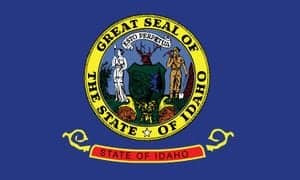Idaho's marriage laws are pretty restrictive. They neither allow gays to marry in-state nor do they recognize out of state gay marriages. Idaho nullifies legal marriages performed elsewhere, turning husbands into legal strangers.
Judge Dale takes this state of affairs and follows a path of legal reasoning well-worn over the last several years.
First up was Baker v. Nelson, a 1971 Supreme Court order that said that antigay state marriage laws do not raise federal questions applicable for a federal court. That case is no longer applicable because, as Judge Dale stated, much has changed. Since 1971, gays went from presumptive criminals (Bowers v. Hardwick) to a protected minority with constitutional rights (Romer and Lawrence) to citizens qith equal dignity (Windsor). Whereas in 1971, gays had no federal rights to speak of, that is certainly not the case now.
Judge Dale takes us through a wonderfully comprehensive summary and review of the many times — 14, in fact — that the Supreme Court has called the right to marry fundamental. But she went further. The right to marry is not just fundamental; it also transcends the limiting boundaries embodied in Idaho's ban on same-sex marriages. The Court has said that the fundamental right to marry extends not just to one man and one woman, but it is blind to race, to prison confinement, money, or ability to procreate. Lawrence and Windsor ensure that the right is extended to gay persons. Therefore, Idaho's ban infringes this fundamental right.
Finally, Judge Dale address equal protection.
Here we see how equality under the law has radically changed for gays in the last couple of years. The ban on same-sex marriage is a form of antigay discrimination, or discrimination on the basis of sexual orientation. In the Ninth Circuit, where Idaho sits, that kind of discrimination now gets heightened scrutiny because of the appellate court's decision in GlaxoSmithKline v. Abbott Labs. I wrote about that case here, but, in short, the court found that Windsor mandated a heightened level of scrutiny when the state discriminates against gays. In that case, a party to a patent case involving HIV drugs wanted to exclude a juror simply because he is gay. In Latta, the discrimination is against gays marrying, but the scrutiny level still applies.
For Judge Dale, this ends the story. There is no conceivable way for any state to meet the high burden of heightened scrutiny. She even notes that the state could not even meet the lowest form of review because the ban is blatantly irrational. It neither encourages heterosexuals to marry nor creates "optimal" child rearing contexts. Children are not better off in heterosexual households. It cannot stand on morality or tradition alone. As so many judge before her have stated, these ostensible justifications are not even rationally connected to banning gays from marrying, let alone closely connected to the law.
Judge Dale ordered Idaho to stop discriminating against gay couples wishing to marry. Her order goes into effect in two days. This morning she denied the state's request for a stay of the ruling. Stay tuned to Towleroad for the latest developments.
***
Follow me on Twitter and on Facebook.
Ari Ezra Waldman is a professor of law and the Director of the Institute for Information Law and Policy at New York Law School and is concurrently getting his PhD at Columbia University in New York City. He is a 2002 graduate of Harvard College and a 2005 graduate of Harvard Law School. Ari writes weekly posts on law and various LGBT issues.




